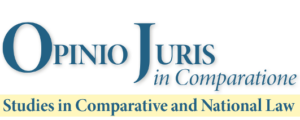- Manuscripts must be submitted online after registration and login, to the section “Online submission” or via ExpressO™ website. Please note that we cannot accept hard copy submissions by post.
- To facilitate the anonymous review process, please confine name, affiliation, biographical information and acknowledgments to a separate cover page since the review process is held without regard to the author’s name, affiliation.
- The submission must include a brief abstract of 250 words or fewer summarizing the article and the relevant Keywords.
- Feel free to include, at your convenience, a cover letter and/or your curriculum vitae.
- The paper should be written in one of the preferred languages for submission (English, French, Italian or Spanish). For publication purpose all contributions should have their title and abstract translated in English as well.
- When the used language is not mother tongue, submitted papers must be language revised by native speakers before the submission. Poor language may justify Editorial staff to refuse or postpone the peer-reviewing process of the paper.
- The article, essay, case note, or book review must be in Word (.doc) or PDF format.
- The text should be in Times New Roman, double spaced, 12-point font. Where available, URLs for the references should be provided. Please employ italics, rather than underlining (except with URL addresses), and make sure that all illustrations, figures, and tables are placed within the text at the appropriate points, rather than at the end.
- Where it occurs, authors are required to structure their texts as follows:
1. Part, typed in bold small capitals, in Roman numerals, e.g. Part I;
2. sub part, typed in bold italic, in Arabic numerals, e.g. 1;
3. Sub-sub-part, in bold type, followed by a letter of the alphabet and a round bracket, e.g. a). - The citation style for Opinio Juris in Comparatione is OSCOLA
- Please remember that authors intending to illustrate/update the scientific and practitioner communities only about a given legal system, should do it in a different language from that of the country they are talking about. To give an example: if an author wants to write his contribution talking on a purely English law subject, he should not do it in English since those able to read articles in English on the subject already do have access to those materials in existing legal literature in English. This requirement should not be understood as allowing for papers that do not provide anything more than a description of a legal concept or problem in a certain legal system, albeit in a different language than that of the described system. Although there is nothing against having descriptive papers, Opinio Juris calls for papers which should at least discuss all relevant views on the topic and also reflect the author’s own opinion.
- Authors retain copyright and grant the journal right of first publication in Opinio Juris. Simultaneously, the work will be licensed under a Creative Commons Attribution 3.0 License permitting readers to use the work so long as the authorship and place of initial publication is acknowledged.
- Authors are permitted and encouraged to post their work online (e.g., in institutional repositories or on their website) but only after the conclusion of the peer review evaluation. Online diffusion can lead to productive exchanges, as well as earlier and greater citation of published work, but at the same time it must be ensured an anonymous evaluation process for every submitted work.
- Authors guarantee that the manuscript is freely available and lawful. Authors release the publisher and the Editors from any liability, damage or claim from third parties. Subject to intent and gross negligence, liability of the editors is excluded.
- No fees are charged for publishing materials in the Journal.
- NB: The journal may use software to screen for plagiarism.
Should you experience any problems using the online submission system, please contact us at staff@opiniojurisincomparatione.org.
